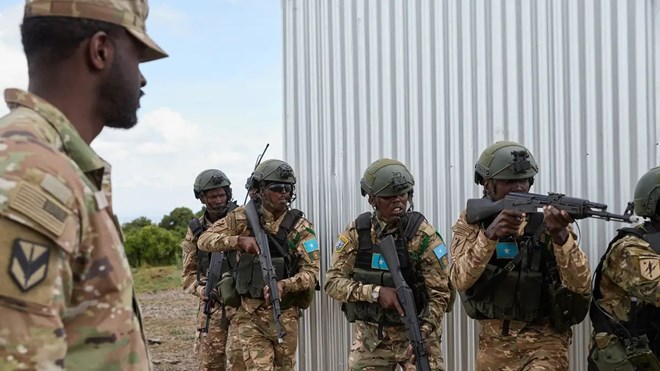Task and Purpose
Wednesday March 27, 2024
BY JEFF SCHOGOL
Somalia remains a battlefield in the War on Terrorism.

A U.S. soldier from the 2nd Security Forces Assistance Brigade observes Somali Danab soldiers conducting urban operations training during Justified Accord 2024 in Nanyuki, Kenya, Feb. 28, 2024. (Sgt. 1st Class Leron Richards/U.S. Army).
Troops from Somalia’s elite Danab, or “Lighting” brigade recently took part in this year’s annual Justified Accord military exercise for the first time, during which they trained with U.S. service members on how to conduct urban operations and counter unmanned aerial systems, defense officials said.
Trained and mentored by U.S. and international advisers, the Danab unit is a special operations unit that plays a critical role in the Somali government’s fight against al-Shabab, a terrorist group that has pledged its allegiance to al-Qaida.
The U.S. military also routinely targets al-Shabab with airstrikes. The most recently announced strike, which took place on March 10 around 71 kilometers southwest of the country’s capital of Mogadishu, is believed to have killed three al-Shabab fighters, according to U.S. Africa Command.
From Feb. 27 to March 7, soldiers with Danab participated in the Justified Accord exercise, which was held at the Counter Insurgency Terrorism and Stability Operations Training Centre in Nanyuki, Kenya.
The training that the Somali soldiers received will be helpful in the fight against al-Shabab, said 2nd Lt. Abdirahim Muse Mohamed, a Danab special forces platoon commander.
Mohamed, who joined Dabab in 2016, said the counter-drone training that his soldiers received during Justified Accord will help them avoid being detected by al-Shabab on the battlefield.
“Most of everything we did here, we will apply in operations,” Mohamed told Task & Purpose in a Feb. 29 interview.
He added that Danab is at the tip of the spear in the fight against al-Shabab.
“The difference between us and the other units is the training we get from the U.S. guys,” Mohamed said. “We get a lot of benefits because they get us and they mentor [us]. They give us whatever we need.”
Danab’s participation in Justified Accord was especially gratifying for Command Sgt. Maj. Reese W. Teakell, the senior enlisted leader for U.S. Army Southern European Task Force, Africa.
Teakell’s first combat deployment was to Mogadishu in 1993 as an Army Ranger. That was the year of Operation Gothic Serpent, the famous battle in which U.S. service members were killed that was later immortalized in the book and movie “Black Hawk Down.”
“With less than one year of experience in the Army, that experience had a tremendous impact on my development as a Soldier and Army professional,” Teakell told Task & Purpose. “To be here 30 years later — and to see where we are — Somali Army Soldiers here in Kenya participating in Exercise Justified Accord, it’s not just important for improving regional security, it’s personally satisfying.”
The exercise with Danab soldiers took place amid the backdrop of the impending end of the African Union Transition Mission in Somalia, or ATMIS. Thousands of troops from African Union nations are expected to withdraw from Somalia by the end of this year.
While the Danab soldiers benefit from the training they get from the U.S. military, they will soon have to face a much larger force of al-Shabab fighters without any help from African Union peacekeepers, said Bill Roggio, a senior fellow with the Foundation for Defense of Democracies think tank in Washington, D.C.
Al-Shabab is more like a standing army than an insurgent organization at this point, Roggio told Task & Purpose in a March 20 interview. Its fighters are organized in a military fashion, and it governs a significant amount of territory in Somalia.
“Assuming the African Union troops leave by the end of the year, the U.S. can’t possibly train enough Danab forces or any Somali forces to withstand what’s coming,” Roggio said. “But the U.S. can help them organize in a fashion that gives them areas to control and govern and to resist al-Shabab.”